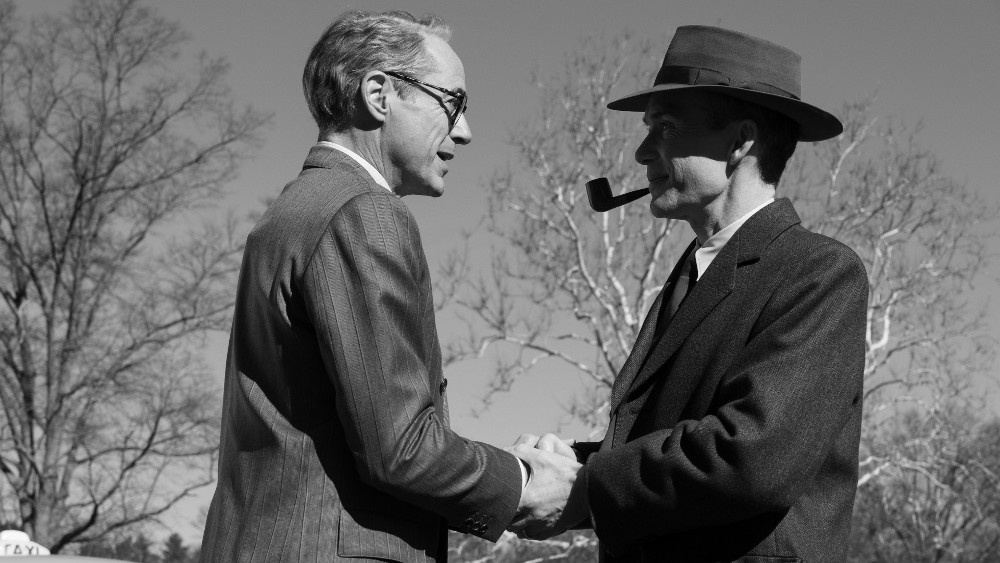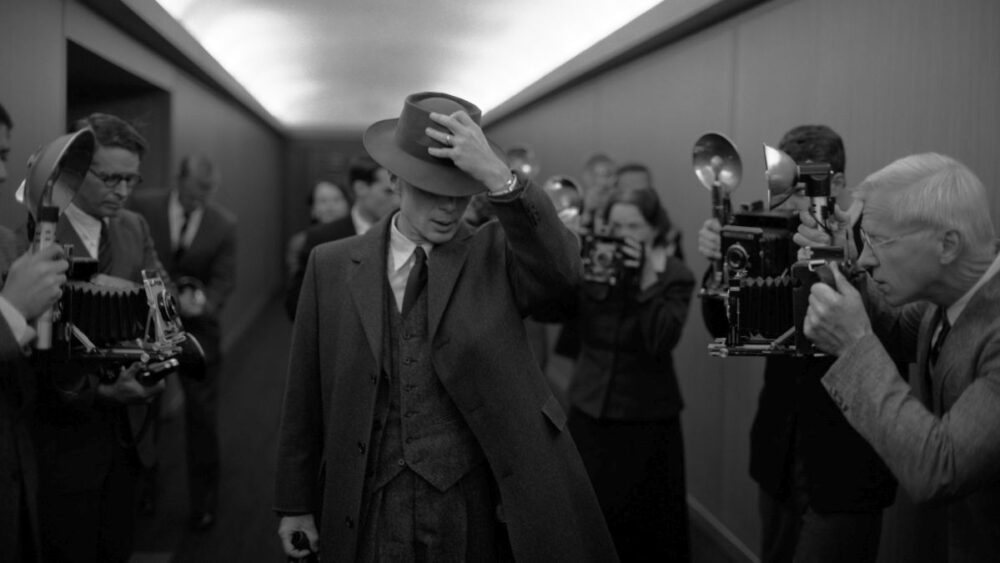
Christopher Nolan—one of the most ingenious filmmakers of the early 21st Century—showcases a parade of the talented and influential creators of the early 20th in his latest film, the biopic Oppenheimer. The film stars the haunting Cillian Murphy as the titular scientist, and explores, Nolan-style, the principal chapters of his troubled but undoubtedly watershed life.
Impressive in its technical execution and narrative strength, the only trouble with Oppenheimer is our realization that Nolan’s creative force has taken to recreate transcendental moments in real history rather than wholly making up invented ones. The former adds to our understanding of a somewhat enigmatic historical figure; the latter adds to our collective cultural libraries, so desperately in need of the creative brilliance of the past century.
The choice of truth over fiction aside, Oppenheimer is Nolan’s best film since 2010’s Inception. In that reality-altering, time and mind-bending thriller, Nolan perfected his signature style of twisting time to explore the adventures of a sympathetic but troubled protagonist. That style is on full display here with Oppenheimer simultaneously flashing images of the scientist in his early days at Berkley and during his later years as a politically outcast pariah. The trick—which plainly evokes the opening sequence of the 2010 movie where Leonardo DiCaprio’s character finds himself wandering lost in his old age while contemplating his youth—evokes the closed circle theories of the space time continuum that Oppenheimer’s contemporaries perfected.

Eventually, the film settles into a groove, and parades a veritable who’s who of 2023’s film stars playing the who’s who of the scientific communities of the past. Kenneth Branagh is Niels Bohr, Danny Deferrari plays Enrico Fermi, and Tom Conti portrays Albert Einstein, who eventually would share Oppenheimer’s devastatingly distraught perspective for the damage that they engendered. Also in the pageant are Emily Blunt as Oppie’s eventual wife Kitty, Florence Pugh as an early, troubled paramour, Matt Damon as Leslie Groves (the Army director of the “Manhattan Project” in New Mexico), and Robert Downey Jr. as the principal antagonist to the story—Lewis Strauss, the eventual chair of the Atomic Commission and a notable anti-communist war hawk.
Oppie is a Jewish leftist, with some indirect ties to the hard left, but mostly (at first) motivated by the horrors of the war in Europe and a genius-like curiosity over the ability to harness the power of the atom. He is intellectually curious, conversing in Picasso and other watershed creators of this time—which Nolan plainly admires. He is at times as confident as he is full of self-doubt, and it is hard to imagine any actor other than Murphy conveying these dualities given his half-smile, pushed down by bulging cheekbones. Oppie and his fellow scientists eventually take to the chalkboard and to writing out complex formulas, but fans of Nolan’s filmography can be confident that he knows how to make the science accessible and delightful.
Nolan’s view of the consequences of the eventual bomb that Oppenheimer helps create are the same as his subject’s—he abhors the destruction and violence that they engendered, so he refuses to glorify the destruction, let alone romanticize war. But he also does not fetishize its devastating consequences, choosing instead to convey the entire tragedy of the dozens of millions lost in those decades through a single man—Oppie, who comes to both regret and, arguably, pay for the sins against humanity he committed. That he does so in a patently unfair fashion, during the Communist witch hunt of the 1950s compounds the punishment. He suffers at the hands of the fascists he essentially dedicated his life to destroy. It is a beautiful but devastating portrayal of the tragedy of genius.

Below the line, Oppenheimer is another Nolan masterpiece, too. The brilliant Hoyt Van Hoytema, who shot Nolan’s Dunkirk, Interstellar, and Inception, returns for the photography of this one as well. Like those films, the cinematography becomes a character together with the bending arc of time. Nolan and Van Hoytema alternate between black and white reels and more colorful, sharper moments. The duality reflects that of Oppie’s own troubled life and soul, and keeps viewers guessing.
For the score, Nolan this time relies on the Oscar-winning talents of Ludwig Goransson (Black Panther), who provides a much more electronically dependent soundtrack as compared to the other frequent music Nolan collaborator, Hans Zimmer. Jennifer Lame edits the film, a gargantuanly difficult task given Nolan’s insistence that nothing is linear, not even a single moment, that more is more, and that keeping the audiences uncomfortable and slightly disoriented is the way to keep them interested. All of it works, despite Oppenheimer’s frontal assault on the senses.
Only brilliant directors can effectively recount the lives of brilliant individuals. What Steven Spielberg could do, for example, in Lincoln, is something most filmmakers cannot come even close to achieving. Nolan is that rare type of film director, the one that intimately understands the person whose life he is recounting, and reveres while slightly pitying the historical figure but never projecting the director’s own experiences into his subject’s.
Oppenheimer succeeds because it is both modest in that sense but also grand in every other, including its acting, technical mastery, and unique vision. That its subject matter caused so much destruction is both tragic and also entirely incidental—it is the man and his foibles that ultimately matter, and the reason to care in the first place.
Grade: A
Oppenheimer is a Universal Studios film coming to theaters July 21, 2023.
Twitter: @jdonbirnam
Instagram: @awards_predix





